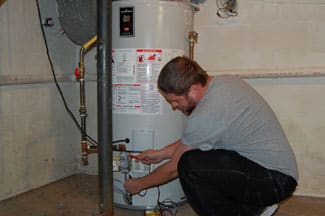Typical Water Heater Complications And Their
Typical Water Heater Complications And Their
Blog Article
We've stumbled upon this article on Water Heaters Problems down the page on the web and figured it made sense to write about it with you in this article.

Picture beginning your day without your routine warm shower. That already establishes a poor tone for the remainder of your day.
Every house requires a reliable hot water heater, but only a few recognize how to take care of one. One very easy means to maintain your water heater in leading shape is to look for faults routinely and also repair them as soon as they show up.
Bear in mind to switch off your hot water heater before smelling around for faults. These are the water heater faults you are most likely to come across.
Water also warm or as well chilly
Every water heater has a thermostat that identifies how warm the water obtains. If the water entering your house is as well hot regardless of setting a practical optimum temperature level, your thermostat could be faulty.
On the other hand, too cold water might result from a stopped working thermostat, a damaged circuit, or inappropriate gas circulation. For instance, if you use a gas hot water heater with a damaged pilot light, you would certainly get cold water, even if the thermostat remains in best condition. For electrical heaters, a blown fuse may be the culprit.
Not nearly enough hot water
Hot water heater come in several sizes, depending upon your warm water demands. If you lack warm water prior to everybody has actually had a bath, your water heater is also tiny for your family size. You ought to take into consideration installing a larger water heater tank or choosing a tankless hot water heater, which occupies much less room and is much more long lasting.
Strange sounds
There are at least five type of sounds you can speak with a water heater, yet one of the most usual analysis is that it's time for the water heater to retire.
To start with, you should be familiar with the typical seems a water heater makes. An electric heating system might sound various from a gas-powered one.
Popping or banging sounds generally indicate there is a slab of debris in your containers, and it's time to clean it out. On the other hand, whistling or hissing audios may simply be your valves letting some stress off.
Water leaks
Leakages can come from pipelines, water connections, shutoffs, or in the worst-case scenario, the container itself. With time, water will wear away the tank, and also locate its way out. If this happens, you require to change your water heater as soon as possible.
However, prior to your modification your entire container, make sure that all pipes remain in area which each shutoff works completely. If you still require help determining a leak, call your plumber.
Rust-colored water
Rust-colored water suggests among your hot water heater elements is corroded. It could be the anode pole, or the storage tank itself. Your plumber will be able to determine which it is.
Lukewarm water
Despite just how high you established the thermostat, you will not obtain any type of warm water out of a heating system well past its prime. A hot water heater's effectiveness may decrease with time.
You will also obtain warm water if your pipelines have a cross link. This implies that when you turn on a faucet, warm water from the heating unit flows in alongside normal, cold water. A cross connection is easy to spot. If your hot water taps still follow shutting the hot water heater valves, you have a cross connection.
Discoloured Water
Corrosion is a major source of filthy or discoloured water. Corrosion within the water storage tank or a failing anode pole can create this discolouration. The anode pole protects the container from rusting on the within and must be inspected annual. Without a pole or a correctly operating anode rod, the hot water swiftly corrodes inside the storage tank. Call a professional water heater service technician to determine if replacing the anode rod will take care of the issue; otherwise, change your hot water heater.
Verdict
Preferably, your hot water heater can last ten years prior to you need a modification. However, after the 10-year mark, you may experience any one of these mistakes extra regularly. At this point, you need to add a new water heater to your spending plan.
How To Troubleshoot 3 Common Water Heater Problems in Twin Cities
The Water Heater Is Leaking
A leaky cold water inlet valve A loose pipe fitting A leaky temperature and pressure relief valve A corroded anode rod A cracked tank Turn Off Your Water Heater:
Shut off your gas water heater by turning the gas valve on the unit to the “OFF” position. Shut off your electric water by switching its power off at your electrical panel. Look for a two-pole breaker labeled “water heater” and turn it to the “OFF” position. Move the ball valve connected to the water heater to be perpendicular to the piping at a 90° angle. Look for the Leak:
Depending on whether the water is coming from the tank's top or bottom, you’ll want to look for the leak in different locations.
If the leak comes from the top of the tank, carefully look for water escaping from the cold water inlet valve or loose pipe fittings. Rusted hot and cold water valves can have loose connections with the tank, with water leaking out of them.
https://mspplumbingheatingair.com/blog/how-to-troubleshoot-3-common-water-heater-problems
I recently found that blog entry about Water Heater Repair and Troubleshooting when doing a lookup on the web. Are you aware of another person who is intrigued by the topic? Why not share it. Thanks a lot for your time spent reading it.
Resolve today, call! Report this page